The Impact of Clausewitz's Paradoxical Trinity on Warfare Strategies
VerifiedAdded on 2020/04/15
|6
|1355
|540
Essay
AI Summary
This essay delves into Carl von Clausewitz's influential concept of the paradoxical trinity, examining its core components: primal violence, chance and probability, and the subordination of war to policy. It explores how these elements interact to shape the nature of warfare. The essay traces the evolution of warfare from the times of Frederick the Great to the 19th and 20th centuries, highlighting the impact of technological advancements, such as the steam engine, on military strategies and logistics. It argues that Clausewitz's trinity remains a relevant framework for understanding the complexities of modern warfare, emphasizing the interplay between the people, the army, and the government. The essay concludes by underscoring the enduring validity of Clausewitz's insights for military theorists and practitioners.
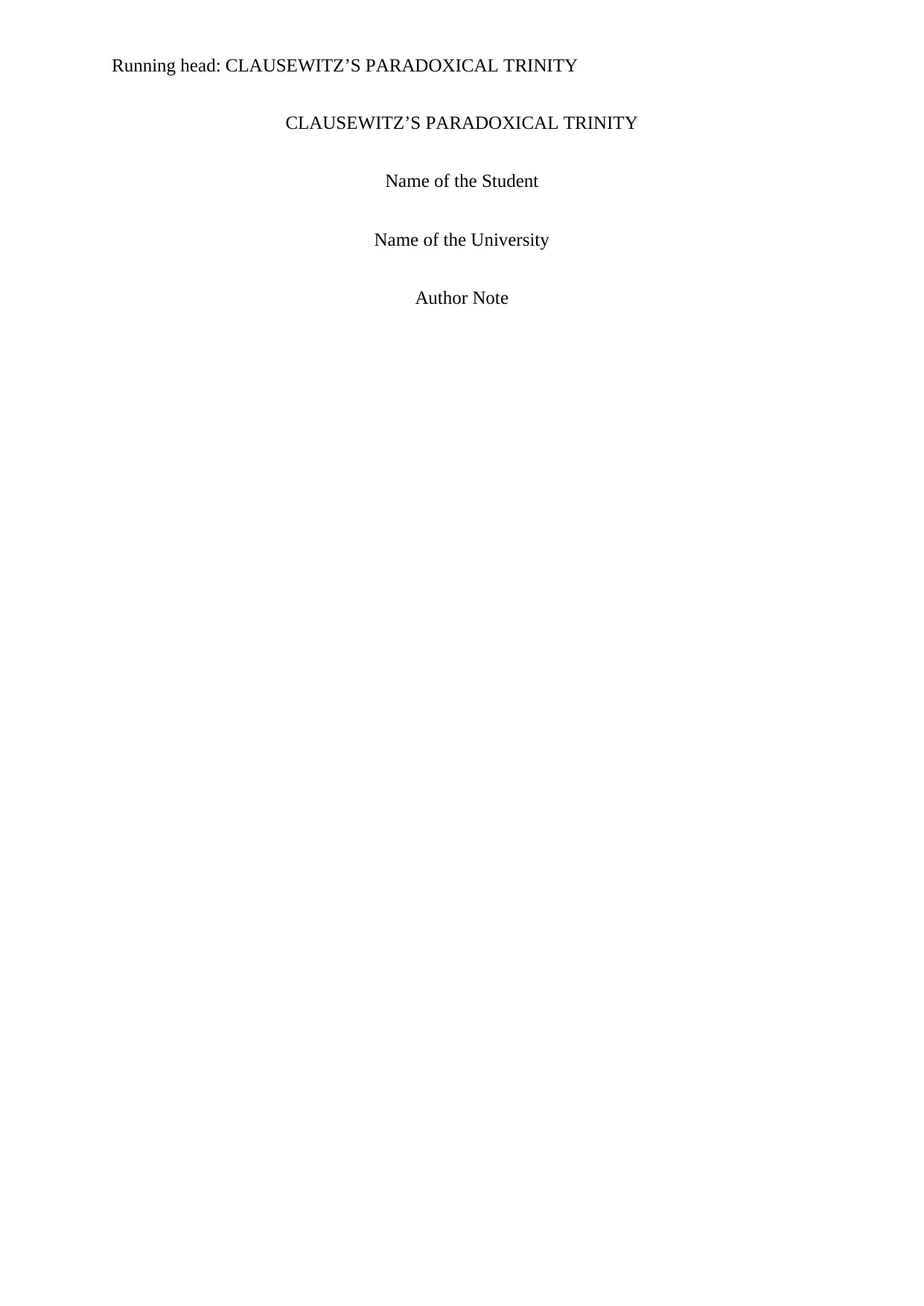
Running head: CLAUSEWITZ’S PARADOXICAL TRINITY
CLAUSEWITZ’S PARADOXICAL TRINITY
Name of the Student
Name of the University
Author Note
CLAUSEWITZ’S PARADOXICAL TRINITY
Name of the Student
Name of the University
Author Note
Paraphrase This Document
Need a fresh take? Get an instant paraphrase of this document with our AI Paraphraser
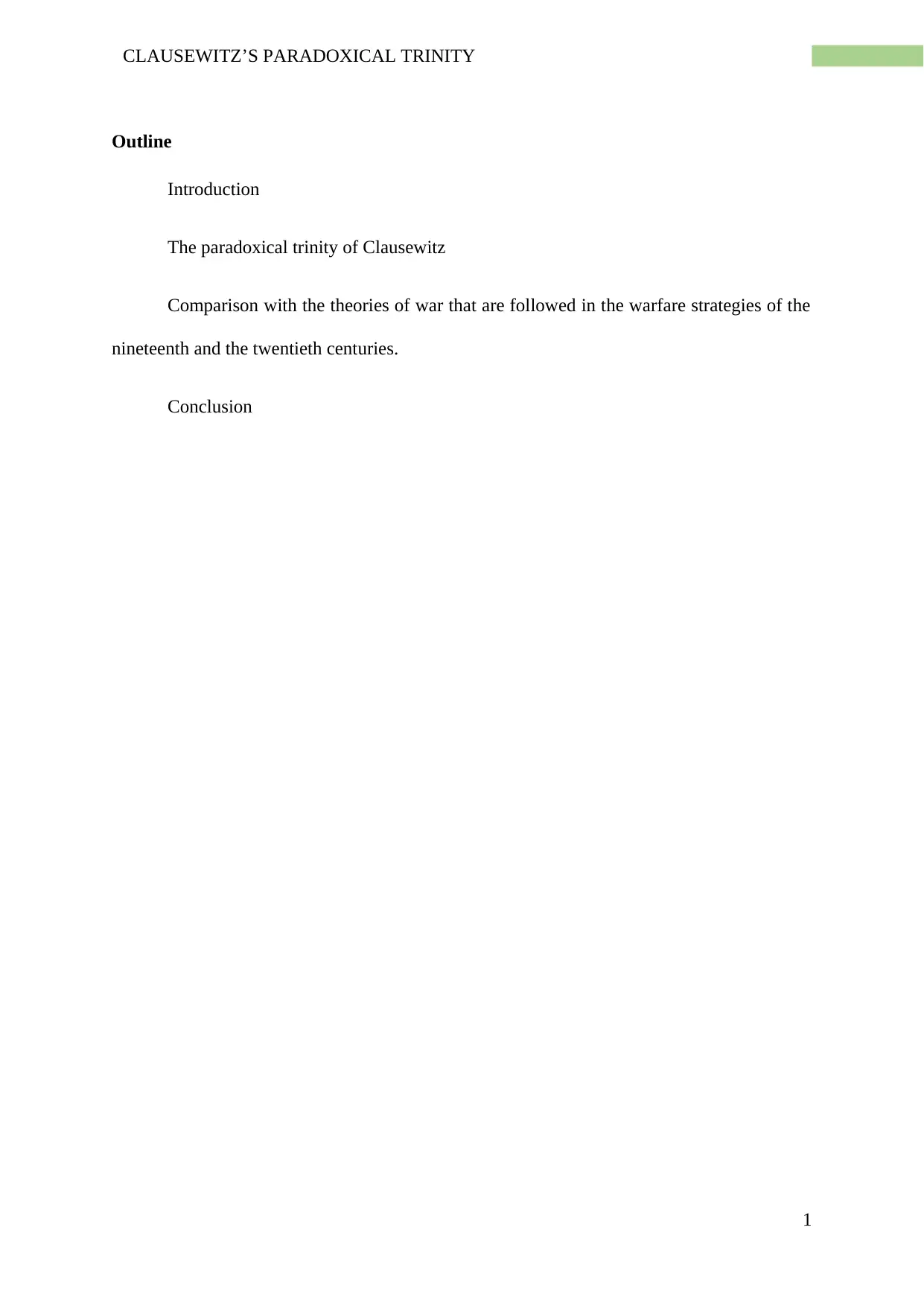
CLAUSEWITZ’S PARADOXICAL TRINITY
Outline
Introduction
The paradoxical trinity of Clausewitz
Comparison with the theories of war that are followed in the warfare strategies of the
nineteenth and the twentieth centuries.
Conclusion
1
Outline
Introduction
The paradoxical trinity of Clausewitz
Comparison with the theories of war that are followed in the warfare strategies of the
nineteenth and the twentieth centuries.
Conclusion
1
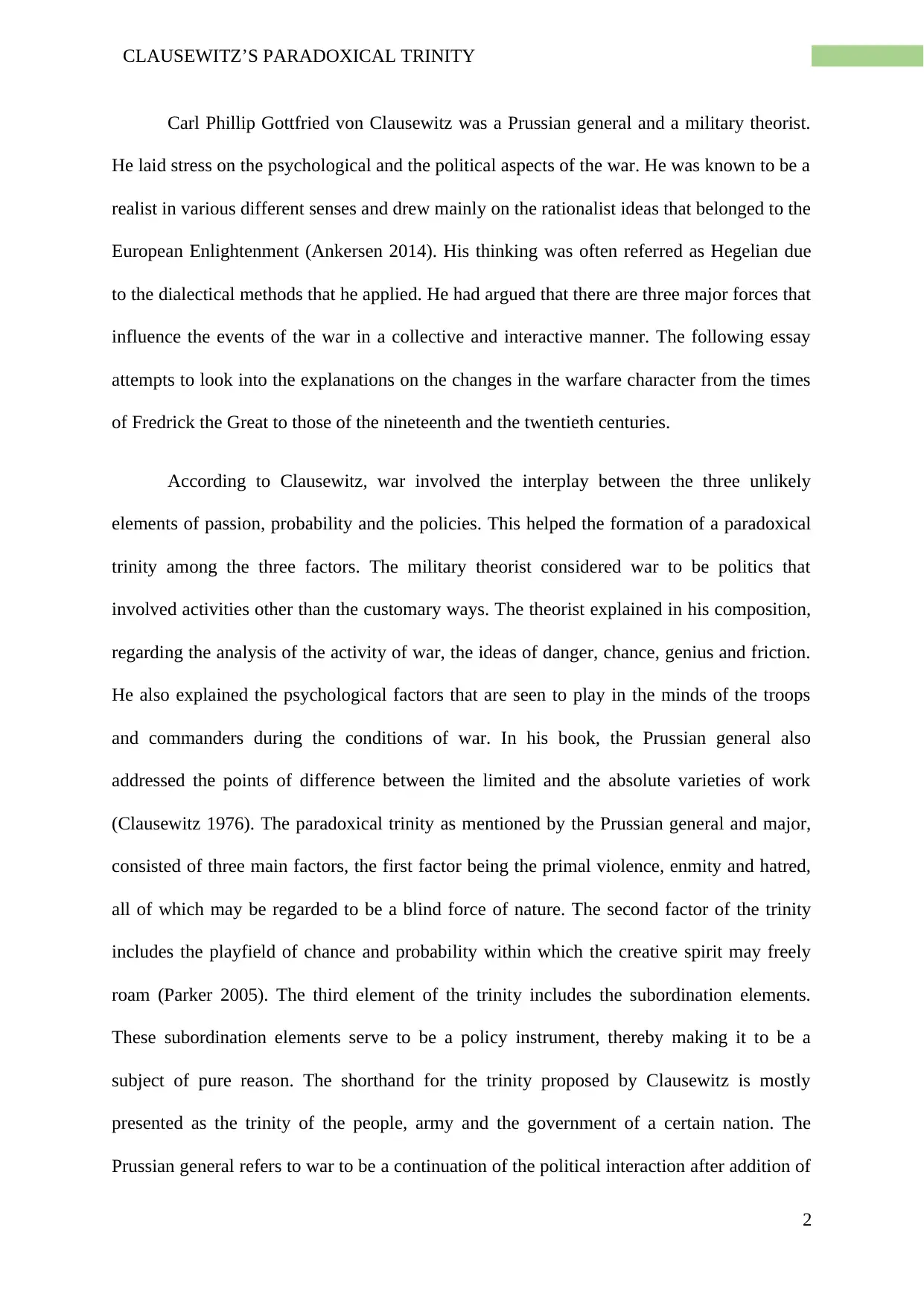
CLAUSEWITZ’S PARADOXICAL TRINITY
Carl Phillip Gottfried von Clausewitz was a Prussian general and a military theorist.
He laid stress on the psychological and the political aspects of the war. He was known to be a
realist in various different senses and drew mainly on the rationalist ideas that belonged to the
European Enlightenment (Ankersen 2014). His thinking was often referred as Hegelian due
to the dialectical methods that he applied. He had argued that there are three major forces that
influence the events of the war in a collective and interactive manner. The following essay
attempts to look into the explanations on the changes in the warfare character from the times
of Fredrick the Great to those of the nineteenth and the twentieth centuries.
According to Clausewitz, war involved the interplay between the three unlikely
elements of passion, probability and the policies. This helped the formation of a paradoxical
trinity among the three factors. The military theorist considered war to be politics that
involved activities other than the customary ways. The theorist explained in his composition,
regarding the analysis of the activity of war, the ideas of danger, chance, genius and friction.
He also explained the psychological factors that are seen to play in the minds of the troops
and commanders during the conditions of war. In his book, the Prussian general also
addressed the points of difference between the limited and the absolute varieties of work
(Clausewitz 1976). The paradoxical trinity as mentioned by the Prussian general and major,
consisted of three main factors, the first factor being the primal violence, enmity and hatred,
all of which may be regarded to be a blind force of nature. The second factor of the trinity
includes the playfield of chance and probability within which the creative spirit may freely
roam (Parker 2005). The third element of the trinity includes the subordination elements.
These subordination elements serve to be a policy instrument, thereby making it to be a
subject of pure reason. The shorthand for the trinity proposed by Clausewitz is mostly
presented as the trinity of the people, army and the government of a certain nation. The
Prussian general refers to war to be a continuation of the political interaction after addition of
2
Carl Phillip Gottfried von Clausewitz was a Prussian general and a military theorist.
He laid stress on the psychological and the political aspects of the war. He was known to be a
realist in various different senses and drew mainly on the rationalist ideas that belonged to the
European Enlightenment (Ankersen 2014). His thinking was often referred as Hegelian due
to the dialectical methods that he applied. He had argued that there are three major forces that
influence the events of the war in a collective and interactive manner. The following essay
attempts to look into the explanations on the changes in the warfare character from the times
of Fredrick the Great to those of the nineteenth and the twentieth centuries.
According to Clausewitz, war involved the interplay between the three unlikely
elements of passion, probability and the policies. This helped the formation of a paradoxical
trinity among the three factors. The military theorist considered war to be politics that
involved activities other than the customary ways. The theorist explained in his composition,
regarding the analysis of the activity of war, the ideas of danger, chance, genius and friction.
He also explained the psychological factors that are seen to play in the minds of the troops
and commanders during the conditions of war. In his book, the Prussian general also
addressed the points of difference between the limited and the absolute varieties of work
(Clausewitz 1976). The paradoxical trinity as mentioned by the Prussian general and major,
consisted of three main factors, the first factor being the primal violence, enmity and hatred,
all of which may be regarded to be a blind force of nature. The second factor of the trinity
includes the playfield of chance and probability within which the creative spirit may freely
roam (Parker 2005). The third element of the trinity includes the subordination elements.
These subordination elements serve to be a policy instrument, thereby making it to be a
subject of pure reason. The shorthand for the trinity proposed by Clausewitz is mostly
presented as the trinity of the people, army and the government of a certain nation. The
Prussian general refers to war to be a continuation of the political interaction after addition of
2
⊘ This is a preview!⊘
Do you want full access?
Subscribe today to unlock all pages.

Trusted by 1+ million students worldwide
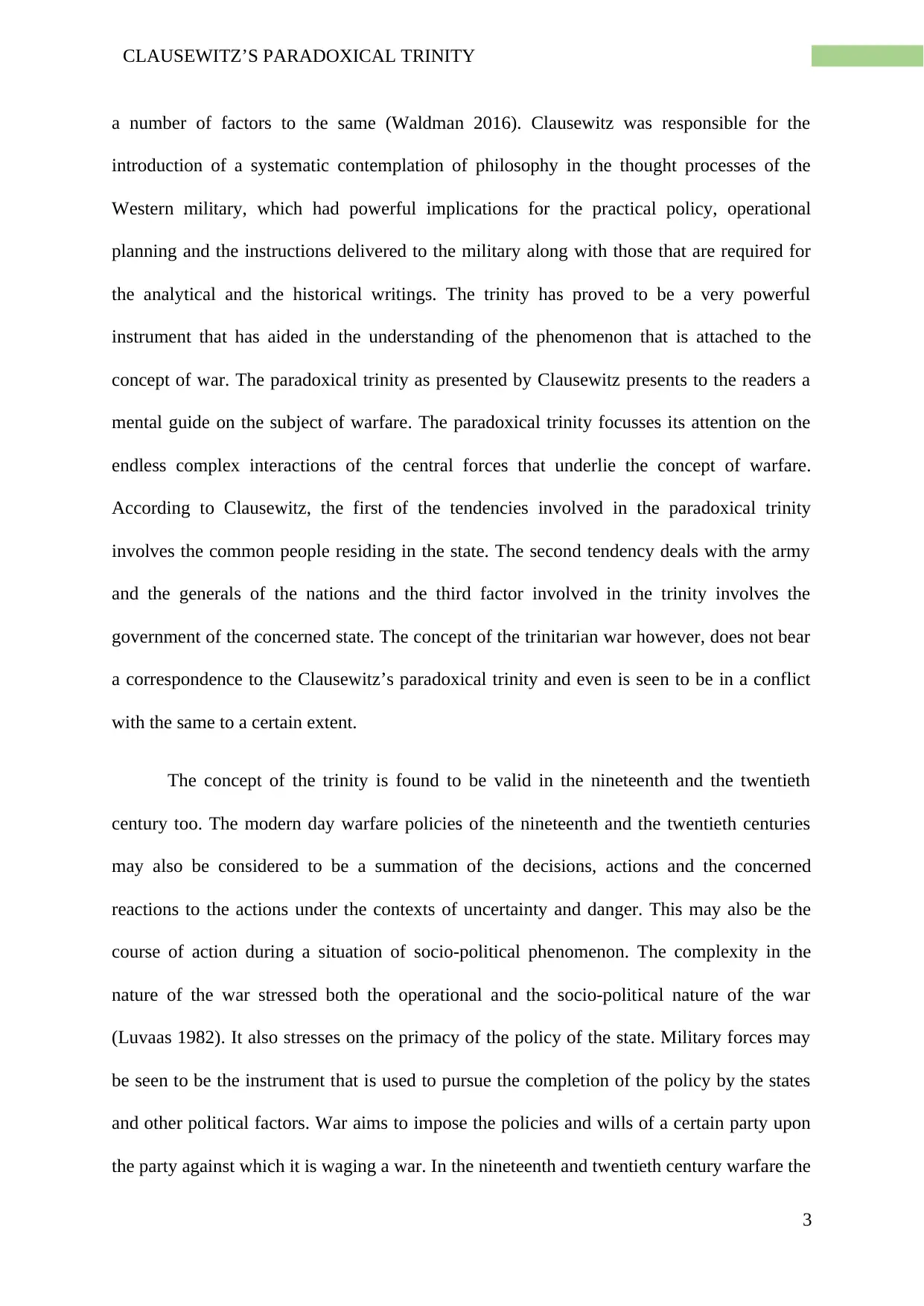
CLAUSEWITZ’S PARADOXICAL TRINITY
a number of factors to the same (Waldman 2016). Clausewitz was responsible for the
introduction of a systematic contemplation of philosophy in the thought processes of the
Western military, which had powerful implications for the practical policy, operational
planning and the instructions delivered to the military along with those that are required for
the analytical and the historical writings. The trinity has proved to be a very powerful
instrument that has aided in the understanding of the phenomenon that is attached to the
concept of war. The paradoxical trinity as presented by Clausewitz presents to the readers a
mental guide on the subject of warfare. The paradoxical trinity focusses its attention on the
endless complex interactions of the central forces that underlie the concept of warfare.
According to Clausewitz, the first of the tendencies involved in the paradoxical trinity
involves the common people residing in the state. The second tendency deals with the army
and the generals of the nations and the third factor involved in the trinity involves the
government of the concerned state. The concept of the trinitarian war however, does not bear
a correspondence to the Clausewitz’s paradoxical trinity and even is seen to be in a conflict
with the same to a certain extent.
The concept of the trinity is found to be valid in the nineteenth and the twentieth
century too. The modern day warfare policies of the nineteenth and the twentieth centuries
may also be considered to be a summation of the decisions, actions and the concerned
reactions to the actions under the contexts of uncertainty and danger. This may also be the
course of action during a situation of socio-political phenomenon. The complexity in the
nature of the war stressed both the operational and the socio-political nature of the war
(Luvaas 1982). It also stresses on the primacy of the policy of the state. Military forces may
be seen to be the instrument that is used to pursue the completion of the policy by the states
and other political factors. War aims to impose the policies and wills of a certain party upon
the party against which it is waging a war. In the nineteenth and twentieth century warfare the
3
a number of factors to the same (Waldman 2016). Clausewitz was responsible for the
introduction of a systematic contemplation of philosophy in the thought processes of the
Western military, which had powerful implications for the practical policy, operational
planning and the instructions delivered to the military along with those that are required for
the analytical and the historical writings. The trinity has proved to be a very powerful
instrument that has aided in the understanding of the phenomenon that is attached to the
concept of war. The paradoxical trinity as presented by Clausewitz presents to the readers a
mental guide on the subject of warfare. The paradoxical trinity focusses its attention on the
endless complex interactions of the central forces that underlie the concept of warfare.
According to Clausewitz, the first of the tendencies involved in the paradoxical trinity
involves the common people residing in the state. The second tendency deals with the army
and the generals of the nations and the third factor involved in the trinity involves the
government of the concerned state. The concept of the trinitarian war however, does not bear
a correspondence to the Clausewitz’s paradoxical trinity and even is seen to be in a conflict
with the same to a certain extent.
The concept of the trinity is found to be valid in the nineteenth and the twentieth
century too. The modern day warfare policies of the nineteenth and the twentieth centuries
may also be considered to be a summation of the decisions, actions and the concerned
reactions to the actions under the contexts of uncertainty and danger. This may also be the
course of action during a situation of socio-political phenomenon. The complexity in the
nature of the war stressed both the operational and the socio-political nature of the war
(Luvaas 1982). It also stresses on the primacy of the policy of the state. Military forces may
be seen to be the instrument that is used to pursue the completion of the policy by the states
and other political factors. War aims to impose the policies and wills of a certain party upon
the party against which it is waging a war. In the nineteenth and twentieth century warfare the
3
Paraphrase This Document
Need a fresh take? Get an instant paraphrase of this document with our AI Paraphraser
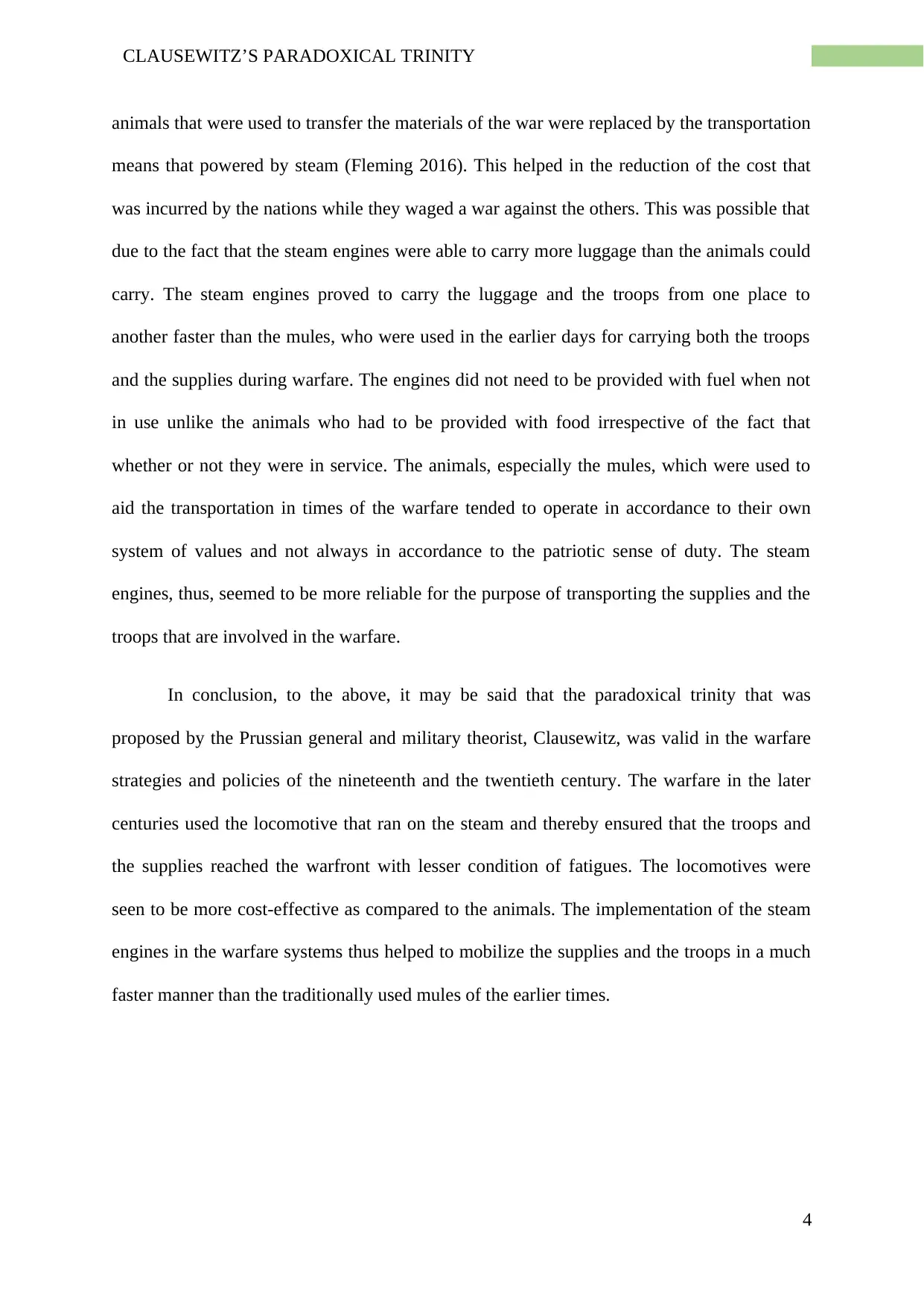
CLAUSEWITZ’S PARADOXICAL TRINITY
animals that were used to transfer the materials of the war were replaced by the transportation
means that powered by steam (Fleming 2016). This helped in the reduction of the cost that
was incurred by the nations while they waged a war against the others. This was possible that
due to the fact that the steam engines were able to carry more luggage than the animals could
carry. The steam engines proved to carry the luggage and the troops from one place to
another faster than the mules, who were used in the earlier days for carrying both the troops
and the supplies during warfare. The engines did not need to be provided with fuel when not
in use unlike the animals who had to be provided with food irrespective of the fact that
whether or not they were in service. The animals, especially the mules, which were used to
aid the transportation in times of the warfare tended to operate in accordance to their own
system of values and not always in accordance to the patriotic sense of duty. The steam
engines, thus, seemed to be more reliable for the purpose of transporting the supplies and the
troops that are involved in the warfare.
In conclusion, to the above, it may be said that the paradoxical trinity that was
proposed by the Prussian general and military theorist, Clausewitz, was valid in the warfare
strategies and policies of the nineteenth and the twentieth century. The warfare in the later
centuries used the locomotive that ran on the steam and thereby ensured that the troops and
the supplies reached the warfront with lesser condition of fatigues. The locomotives were
seen to be more cost-effective as compared to the animals. The implementation of the steam
engines in the warfare systems thus helped to mobilize the supplies and the troops in a much
faster manner than the traditionally used mules of the earlier times.
4
animals that were used to transfer the materials of the war were replaced by the transportation
means that powered by steam (Fleming 2016). This helped in the reduction of the cost that
was incurred by the nations while they waged a war against the others. This was possible that
due to the fact that the steam engines were able to carry more luggage than the animals could
carry. The steam engines proved to carry the luggage and the troops from one place to
another faster than the mules, who were used in the earlier days for carrying both the troops
and the supplies during warfare. The engines did not need to be provided with fuel when not
in use unlike the animals who had to be provided with food irrespective of the fact that
whether or not they were in service. The animals, especially the mules, which were used to
aid the transportation in times of the warfare tended to operate in accordance to their own
system of values and not always in accordance to the patriotic sense of duty. The steam
engines, thus, seemed to be more reliable for the purpose of transporting the supplies and the
troops that are involved in the warfare.
In conclusion, to the above, it may be said that the paradoxical trinity that was
proposed by the Prussian general and military theorist, Clausewitz, was valid in the warfare
strategies and policies of the nineteenth and the twentieth century. The warfare in the later
centuries used the locomotive that ran on the steam and thereby ensured that the troops and
the supplies reached the warfront with lesser condition of fatigues. The locomotives were
seen to be more cost-effective as compared to the animals. The implementation of the steam
engines in the warfare systems thus helped to mobilize the supplies and the troops in a much
faster manner than the traditionally used mules of the earlier times.
4
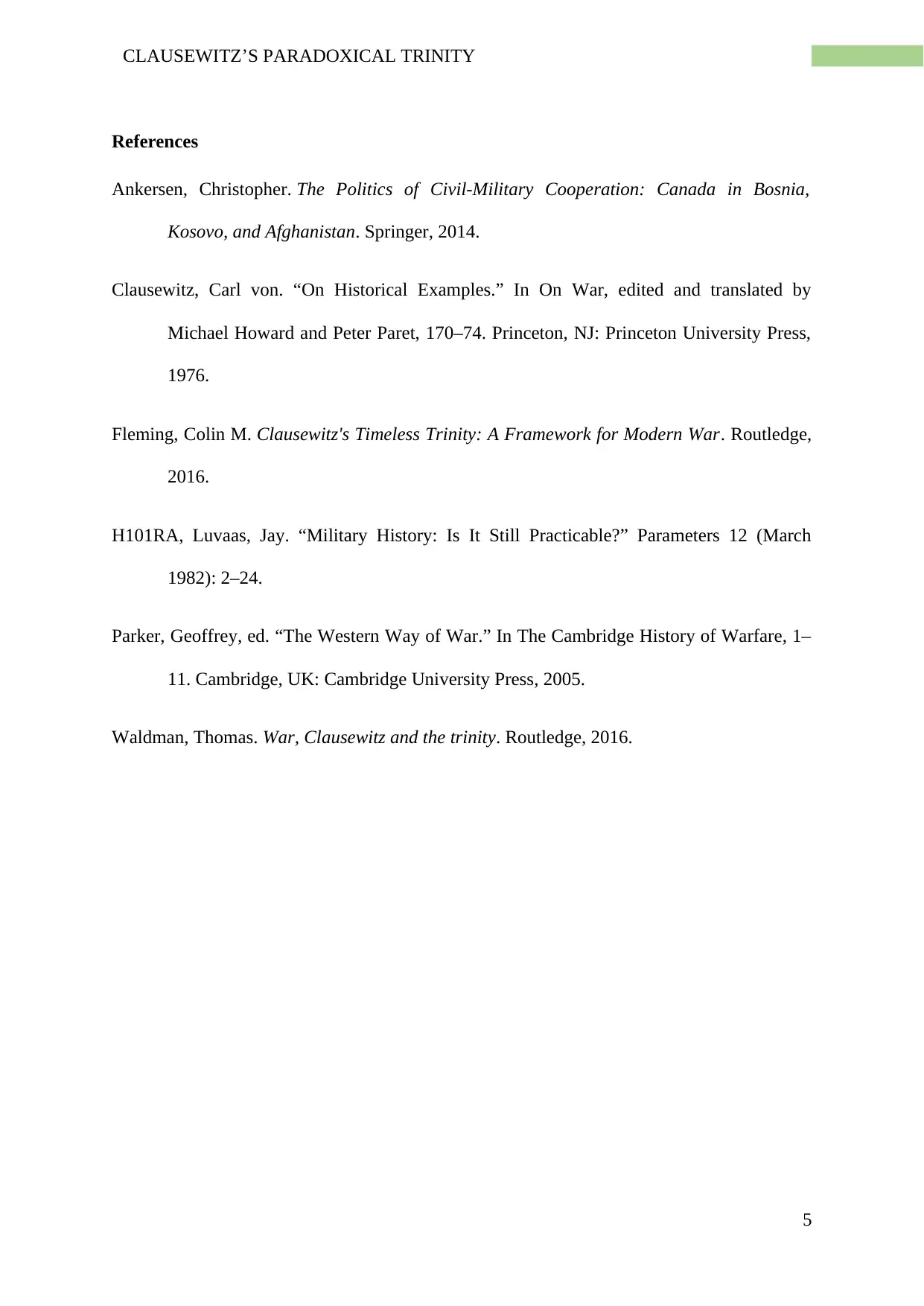
CLAUSEWITZ’S PARADOXICAL TRINITY
References
Ankersen, Christopher. The Politics of Civil-Military Cooperation: Canada in Bosnia,
Kosovo, and Afghanistan. Springer, 2014.
Clausewitz, Carl von. “On Historical Examples.” In On War, edited and translated by
Michael Howard and Peter Paret, 170–74. Princeton, NJ: Princeton University Press,
1976.
Fleming, Colin M. Clausewitz's Timeless Trinity: A Framework for Modern War. Routledge,
2016.
H101RA, Luvaas, Jay. “Military History: Is It Still Practicable?” Parameters 12 (March
1982): 2–24.
Parker, Geoffrey, ed. “The Western Way of War.” In The Cambridge History of Warfare, 1–
11. Cambridge, UK: Cambridge University Press, 2005.
Waldman, Thomas. War, Clausewitz and the trinity. Routledge, 2016.
5
References
Ankersen, Christopher. The Politics of Civil-Military Cooperation: Canada in Bosnia,
Kosovo, and Afghanistan. Springer, 2014.
Clausewitz, Carl von. “On Historical Examples.” In On War, edited and translated by
Michael Howard and Peter Paret, 170–74. Princeton, NJ: Princeton University Press,
1976.
Fleming, Colin M. Clausewitz's Timeless Trinity: A Framework for Modern War. Routledge,
2016.
H101RA, Luvaas, Jay. “Military History: Is It Still Practicable?” Parameters 12 (March
1982): 2–24.
Parker, Geoffrey, ed. “The Western Way of War.” In The Cambridge History of Warfare, 1–
11. Cambridge, UK: Cambridge University Press, 2005.
Waldman, Thomas. War, Clausewitz and the trinity. Routledge, 2016.
5
⊘ This is a preview!⊘
Do you want full access?
Subscribe today to unlock all pages.

Trusted by 1+ million students worldwide
1 out of 6